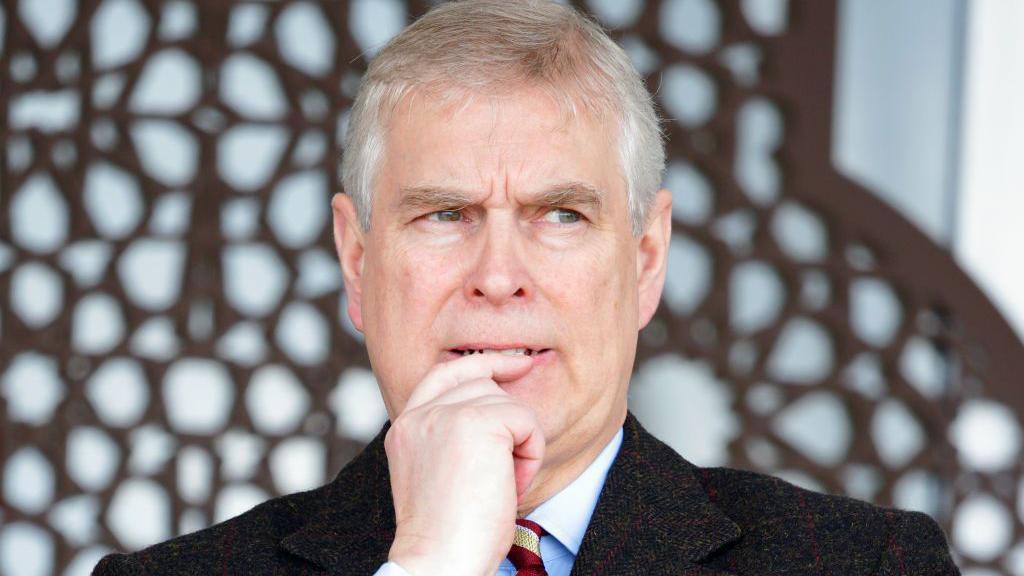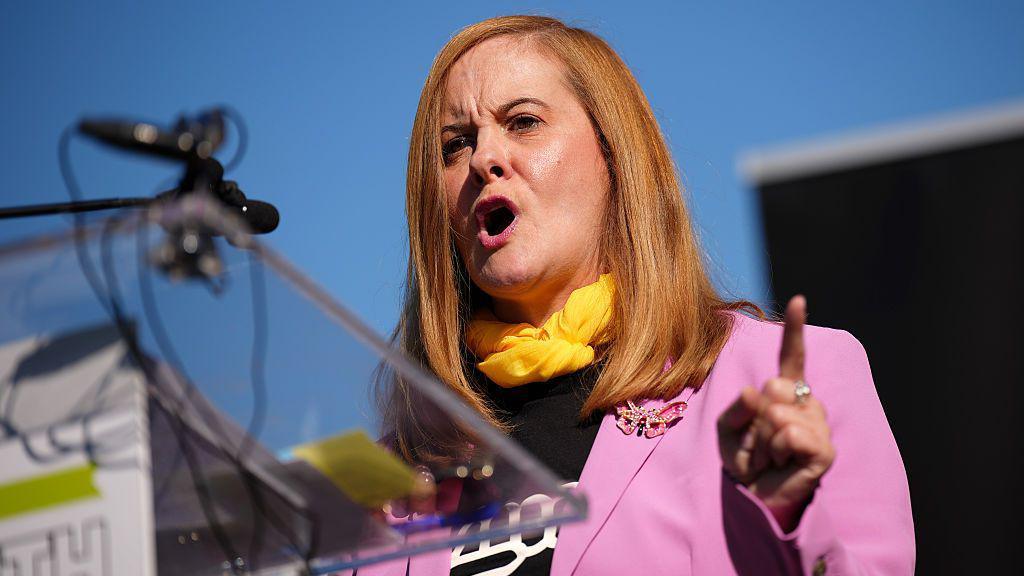Andrew should answer Epstein questions in US, Democrats say

Andrew was stripped of his title as a prince on Thursday
- Published
Members of a US congressional committee investigating the Jeffrey Epstein case have intensified their calls for Andrew Mountbatten Windsor to answer questions about his links to the late sex offender.
King Charles stripped his brother of his "prince" title on Thursday, following months of pressure over Andrew's ties to Epstein. Andrew has always denied wrongdoing.
At least four Democrat members of the House Oversight Committee have since renewed their calls for Andrew to testify - although the panel is controlled by Republicans, who have not indicated they would support the move.
Congressman Suhas Subramanyam told the BBC: "If he wants to clear his name, if he wants to do right by the victims, he will come forward".
Andrew could appear remotely, have a lawyer present and could speak to the panel privately, Subramanyam said.
"Frankly, Andrew's name has come up many times from the victims," he told Radio 4's Today programme on Saturday.
"So he clearly has knowledge of what happened and we just want him to come forward and tell us what he knows."
He added: "No matter who it is - American or not - everyone should be looked at."
Fellow committee member Raja Krishnamoorthi told BBC Newsnight he would be willing to formally summon Andrew with a subpoena - although he conceded this would be difficult to enforce while he was outside of the US.
He said on Friday: "However, if Andrew wishes to come to the United States or he's here, then he's subject to the jurisdiction of the US Congress, and I would expect him to testify."
He added: "At the end of the day, we want to know exactly what happened, not just to give justice to the survivors, but to prevent this from ever happening again."
"Come clean. Come before the US Congress, voluntarily testify. Don't wait for a subpoena. Come and testify and tell us what you know."
Congressman Stephen Lynch also told the BBC hearing from Andrew "might be helpful in getting justice for these survivors" but said the committee would be unable to subpoena him "as the situation stands".
Meanwhile, Liz Stein - one of Epstein's accusers - said Andrew should "take some initiative" and help US investigators.
She told BBC Breakfast on Saturday: "A lot of us are curious as to why he's unwilling to cooperate and be questioned about his involvement with Epstein."
"If he has nothing to hide, then why is he hiding?"
"We know he had a longstanding friendship with Epstein and that he was in his social circle - so he may have seen things during his involvement with Epstein that he could speak to."
Another of Epstein's accusers, Anouska De Georgiou, likewise told Newsnight Andrew should appear before Congress, saying "it would be appropriate for him to be treated the same as anybody else would be treated".

Liz Stein said Andrew should step in and help investigators
It comes after UK trade minister Chris Bryant told the BBC Andrew should go to the US to answer questions about Epstein's crimes if invited, "just as with any ordinary member of the public".
Meanwhile, the police watchdog said it had approached the Metropolitan Police to ask whether there are matters it should be looking into, in light of media reports about Andrew.
The Independent Office for Police Conduct said it had contacted Scotland Yard's Directorate of Professional Standards last week - which oversees internal investigations into misconduct - and had not yet received any referrals.
Reports emerged in mid-October that Andrew sought to obtain personal information about his accuser Virginia Giuffre through his police protection in 2011. He has not commented on the reports, while the Metropolitan Police previously said it was "actively" looking into them.
Separately, new court documents published in the US on Friday showed that Andrew wrote in an email in 2010 that it would be "good to catch up in person" with Epstein, after he was released from prison for soliciting prostitution from a minor.
The pair were then pictured together in Central Park in New York in December 2010, in a meeting that Andrew later told the BBC was to break off their friendship.
Andrew's ties to Epstein were at the centre of Thursday's decision, with the Palace announcement stating: "These censures are deemed necessary, notwithstanding the fact that he continues to deny the allegations against him."
"Their Majesties wish to make clear that their thoughts and utmost sympathies have been, and will remain with, the victims and survivors of any and all forms of abuse."
In recent weeks, pressure had increased on the monarchy to resolve the issue of Charles's brother.
In early October, emails which re-emerged from 2011 showed Andrew in contact with Epstein months after he claimed their friendship had ended.
A posthumous memoir by Virginia Giuffre was also released - repeating allegations that, as a teenager, she was forced to have sex with Andrew on three separate occasions, claims he has always denied.
And earlier this week, the King was heckled about the matter.
Although Andrew denies the accusations, the Royal Family considers there have been "serious lapses of judgement" in his behaviour.
As well as losing his titles and honours, he was ordered to move out of his Windsor mansion - Royal Lodge - and into a property on the King's Norfolk estate, paid for by the monarch.
The BBC understands that he will not have to move out immediately, and could move to Sandringham as late as the new year.
On Saturday, a black Land Rover with a number plate ending DOY was seen leaving Bishops Gate near Royal Lodge just before 08:00 GMT.
Only a driver was in the vehicle as it left the grounds of Windsor Great Park. Andrew has previously been pictured driving a vehicle with the same private number plate.